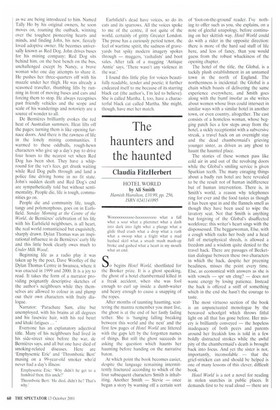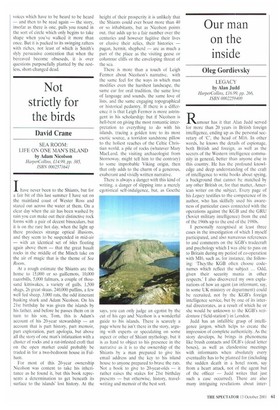The haunters and the haunted
Claudia FitzHerbert
HOTEL WORLD by Ali Smith Hamish Hamilton, £10.99, pp. 256, ISBN 0241141095
W00000000000-h000000000 what a fall what a soar what a plummet what a dash into dark into light what a plunge what a glide thud crash what a drop what a rush what a swoop what a fright what a mad hushed skirl what a smash mush mash-up broke and gashed what a heart in my mouth what an end.
Sa begins Hotel World, shortlisted for the Booker prize. It is a ghost speaking, the ghost of a hotel chambermaid killed in a freak accident, when she was fool enough to curl up inside a dumb-waiter and heavy enough to cause a snapping of the ropes.
After months of taunting haunting, scattering the mantra remember you must live, the ghost is at the end of her fastly fading tether. She is 'hanging falling breaking between this world and the next' and the first few pages of Hotel World are littered with the gaps left by the forgotten names of things. But still the ghost succeeds in asking the question which haunts her haunting before handing on the narrative baton.
At which point the book becomes easier, despite the language remaining intermittently fractured according to which of the four subsequent characters Smith is inhabiting. Another Smith — Stevie — once began a story by warning off a certain sort of 'foot-on-the-ground' reader. I've nothing to offer such as you, she explains, on a note of gleeful unapology, before continuing on her skittish way. Hotel World could do with a rider in the opposite direction: there is more of the hard sad stuff of life here, and less of fancy, than you would guess from the robust whackiness of the opening chapter.
The hotel of the title, the Global, is a tackily plush establishment in an unnamed town in the north of England. The northernness is incidental: the Global is a chain which boasts of delivering the same experience everywhere, and Smith goes along with the bumf insofar as she writes about women whose lives could intersect in similar ways with a similar hotel in another town, or even country, altogether. The cast consists of a homeless woman, whose begging patch lies a few steps away from the hotel, a sickly receptionist with a subversive streak, a travel hack on an overnight stay and the dead chambermaid's grieving younger sister, as driven as any ghost to haunt the haunted place.
The stories of these women pass like cold air in and out of the revolving doors while the Global's smiling service is given Sparkian teeth. The many enraging things about a badly run hotel are here revealed to be the result not of human indifference but of human intervention. There is, in Smith's world, a reason why telephones ring for ever and the food tastes as though it has been spat in and the flannels smell as though they have been used to wipe the lavatory seat. Not that Smith is anything but forgiving of the Global's disaffected workforce: this writer's heart sings with the dispossessed. The beggarwoman, Else, with a cough which racks her body and a head full of metaphysical shreds, is allowed a freedom and a wisdom quite denied to the travel hack. There are passages of Beckettian dialogue between these two characters in which the hack, despite her preening beadiness, misses the point every time. Else, as economical with answers as she is with vowels — spr sm chng? — does not waste energy by losing patience. Instead the hack is offered a sniff of something which in the end she hasn't the courage to taste.
The most virtuoso section of the book is an unpunctuated monologue by the bereaved schoolgirl which throws fitful light on all that has gone before. Her miseryis brilliantly conveyed — the hopeless inadequacy of both peers and parents around her freakish loss is told in a few boldly distracted strokes while the awful pity of the chambermaid's death is brought back into focus. And yet the sister is not, importantly. inconsolable — that the grief-stricken can and should be helped is one of many lessons of this clever, difficult book.
Hotel World is a not a novel for reading in stolen snatches in public places. It demands first to be read aloud — there are voices which have to he heard to be heard — and then to be read again — the story, insofar as there is one, pulls you round in the sort of circle which only begins to take shape when you've walked it more than once. But it is packed to its swinging rafters with riches, not least of which is Smith's slyly persuasive contention that when the bereaved become obseseds, it is over questions purposefully planted by the restless, short-changed dead.



























































































 Previous page
Previous page